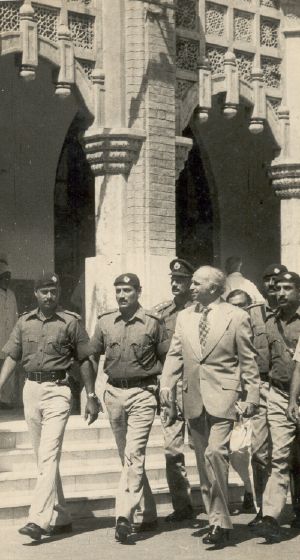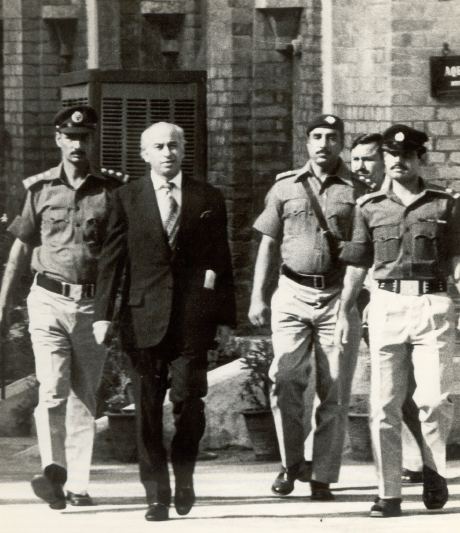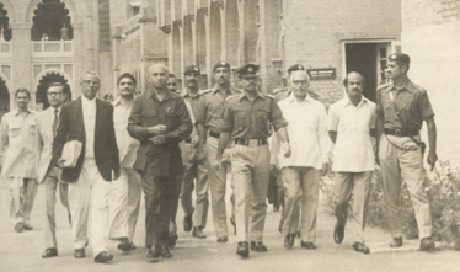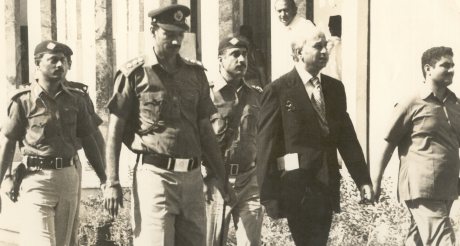 A large number of the photographs in the F.E. Chaudhry Collection are of Zulfiqar Ali Bhutto during the time of the Bhutto Primiership. None are more riveting for those interested in Pakistan’s history than the one of Mr. Bhutto’s trial in the Lahore High Court during 1978.
A large number of the photographs in the F.E. Chaudhry Collection are of Zulfiqar Ali Bhutto during the time of the Bhutto Primiership. None are more riveting for those interested in Pakistan’s history than the one of Mr. Bhutto’s trial in the Lahore High Court during 1978.
In the last installment from the F.E. Choudhry Gallery we brought you scenes of public agitation from outside the Lahore High Court where Zulfiqar Ali Bhutto’s trial was proceeding. Today we bring you some amazing photographs from inside the Lahore High Court.
These pictures are amazing indeed. If you did not know of the context you would never guess that the smartly dressed, confident, self-assured man in all of them is the “accused” being led by his captives to court. It truly reminds one of Faiz Ahmad Faiz’s immortal verse:
jiss dhajj say koee maqtal meiN gaya
woh shaan salamat rehti hai,
Yeh jaan tou aani jaani hai
iss jaan ki koee baat nahiN
If one did not know of the context one could easily assume that this is a confident Prime Minister, walking with his head held high, accompanied by his security detail. Instead, what it actually is a deposed Prime Minister being taken to court for a mock trial by the dictator who disposed him and surrounded by his captors and guards. He walks elegantly and confidently in and out of the court while police escorts follows keeping a respectful distance as if led by Mr. Bhutto into a state function.
![]()
These four photographs attest to Mr. Bhutto’s sense of dress and decorum, but even more to his sense of history. Each one rivals the others in terms of Bhutto’s formal attire. Of course, Mr. Bhutto knew the fate that awaited him and in some ways he dressed not just for that moment, but for that fate. His sense of defiance was reflected through his choice of clothes and his calm, confident and self-assured appearance.
All these photographs from chacha F.E. Chaudhry, but especially this next one, also demonstrate what leadership really is. It comes not just from the office but from the person. It is the police that is supposed to be “leading” Zulfiqar Ali Bhutto to court, and he who is supposed to be “following” them. Instead, it is very clear for all to see who is “leading” whom. Those with the guns and batons are “following” the dictates of a dictator. Those whose spirit they are meant to break, a man of many faults no doubts, walks with his head held high because he “leads” with his conscience.
Click here for the evolving F.E. Choudhry Gallery at ATP.























































In the last picture, is he handcuffed to the man on his left?
Yes, Bhutto had many faults and he indeed had the ‘feudal’ tendencies. Yet fuedalism is not confined to landed gentry: It is a state of mind which permeates the Pakistani societies in all places. Jang newspaper has an article by Dr. Safdar Mahmood (the speaker of Zia ul Haq’s Majlis e Shoora?) in which he quite brilliantly points out the various feudal parts of Pakistani society–but urban and rural. Civilian and military. The article was published in Urdu within last 6-7 months and can be looked up; that could be a good separate topic for ATP.
As to Bhutto’s achievements, they are indeed too numerous to be listed here. But I will respond to someone below who says that Bhutto amended the Constitution to suit his own goals: The PPP did not have to consult anyone to frame the 1973 Constitution in the first place being in a 2/3rd majority in the parliament. The PPP could have chosen whatever it wanted to to ensure that political field would always be in PPP’s favor and that opponents’ moves could be termed ‘unconstitutional’ regardless of their merit. But that was not done so. And anyone growing up in Pakistan through the 70s would tell you that the ‘autocratic’ Bhutto took quite a beating in both media and public demonstrations against him in the height of his power. Indeed he did respond brutally but I am almost certain that the so called leaders of the opposition would do the same. The only Const. Amendment I find unacceptable to me is the declaration of Qadianis as non-Muslims. Other than that, the PPP was well within its rights to amend the Const. being entrusted by the people.
Finally, thanks for sharing the pictures. It is too painful to watch all of them and so I won’t follow the link. But, just like Sidhas, I too grew up in Karachi as PNA supporter and a Bhutto hater but have grown to like the Bhuttos a lot.
Long live Bhuttos!
Malik,
Let’s not misquote Mr. Bhutto shall we. What he wrote to Iskandar Mirza, after the latter appointed him to the UN mission was that “your name shall be written before even that of Mr. Jinnah”.
It was a run of the mill political comment. Otherwise Bhutto was known to be Jinnah’s greatest admirer and certainly the first political leader to firmly associate Pakistani nationalism to Jinnah’s memory.
From his cell he wrote to Benazir that only three rulers ruled Pakistan fairly and for the people : Quaid-e-Azam, Suhrawardy and Bhutto himself.
His view of Iskandar Mirza was a poor one considering him to be gullible.
Dear Malik,
Reference your comment:
‘The political history of Pakistan is mired in passion, superlatives and blind following. Unless we see deeds, question them, and make leaders accountable, nothing will change. We will continue to make heroes out of dead people!’
A wise and beautiful summary of the delusion of ‘Bhutto-centricity’. What short memories and big, forgiving hearts must our nation have, to forget and to forgive the incompetence and corruption of previous governments and leaders!
While agreeing with the fact that the hanging of ZA Bhutto was an unjust divisive act, Bhutto failed himself and Pakistan.
With everything on his side after 1971 tragedy, Bhutto worked only for own self. His failures as ruler are too many to give him larger than life status.
Bhutto helped formed the 1973 Constitution, but within four hours of its passage, it was changed through a notification, suspending the basic rights of people of Pakistan. Why? Bhutto wanted to arrest most of his political opponents, which he did , and they remained behind bars for four years.
Bhutto served a dictator for eight full years before becoming a “democrat”. For him Iskander Mirza (when he was president) was a greater leader than Jinnah!
He turned out to be one of the most ruthless rulers in Pakistan’s history, both for the opposition and for the people of his party (ask JA Rahim).
The political history of Pakistan is mired in passion, superlatives and blind following. Unless we see deeds, question them, and make leaders accountable, nothing will change. We will continue to make heroes out of dead people!